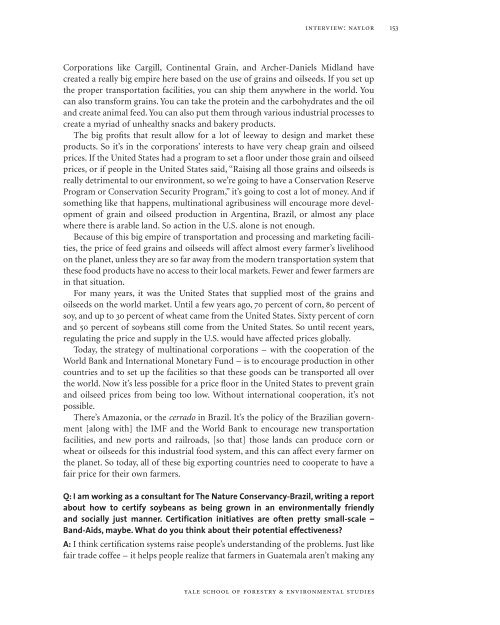Agroecology and the Struggle for Food Sovereignty ... - Yale University
Agroecology and the Struggle for Food Sovereignty ... - Yale University
Agroecology and the Struggle for Food Sovereignty ... - Yale University
You also want an ePaper? Increase the reach of your titles
YUMPU automatically turns print PDFs into web optimized ePapers that Google loves.
interview: naylor<br />
153<br />
Corporations like Cargill, Continental Grain, <strong>and</strong> Archer-Daniels Midl<strong>and</strong> have<br />
created a really big empire here based on <strong>the</strong> use of grains <strong>and</strong> oilseeds. If you set up<br />
<strong>the</strong> proper transportation facilities, you can ship <strong>the</strong>m anywhere in <strong>the</strong> world. You<br />
can also trans<strong>for</strong>m grains. You can take <strong>the</strong> protein <strong>and</strong> <strong>the</strong> carbohydrates <strong>and</strong> <strong>the</strong> oil<br />
<strong>and</strong> create animal feed. You can also put <strong>the</strong>m through various industrial processes to<br />
create a myriad of unhealthy snacks <strong>and</strong> bakery products.<br />
The big profits that result allow <strong>for</strong> a lot of leeway to design <strong>and</strong> market <strong>the</strong>se<br />
products. So it’s in <strong>the</strong> corporations’ interests to have very cheap grain <strong>and</strong> oilseed<br />
prices. If <strong>the</strong> United States had a program to set a floor under those grain <strong>and</strong> oilseed<br />
prices, or if people in <strong>the</strong> United States said, “Raising all those grains <strong>and</strong> oilseeds is<br />
really detrimental to our environment, so we’re going to have a Conservation Reserve<br />
Program or Conservation Security Program,” it’s going to cost a lot of money. And if<br />
something like that happens, multinational agribusiness will encourage more development<br />
of grain <strong>and</strong> oilseed production in Argentina, Brazil, or almost any place<br />
where <strong>the</strong>re is arable l<strong>and</strong>. So action in <strong>the</strong> U.S. alone is not enough.<br />
Because of this big empire of transportation <strong>and</strong> processing <strong>and</strong> marketing facilities,<br />
<strong>the</strong> price of feed grains <strong>and</strong> oilseeds will affect almost every farmer’s livelihood<br />
on <strong>the</strong> planet, unless <strong>the</strong>y are so far away from <strong>the</strong> modern transportation system that<br />
<strong>the</strong>se food products have no access to <strong>the</strong>ir local markets. Fewer <strong>and</strong> fewer farmers are<br />
in that situation.<br />
For many years, it was <strong>the</strong> United States that supplied most of <strong>the</strong> grains <strong>and</strong><br />
oilseeds on <strong>the</strong> world market. Until a few years ago, 70 percent of corn, 80 percent of<br />
soy, <strong>and</strong> up to 30 percent of wheat came from <strong>the</strong> United States. Sixty percent of corn<br />
<strong>and</strong> 50 percent of soybeans still come from <strong>the</strong> United States. So until recent years,<br />
regulating <strong>the</strong> price <strong>and</strong> supply in <strong>the</strong> U.S. would have affected prices globally.<br />
Today, <strong>the</strong> strategy of multinational corporations – with <strong>the</strong> cooperation of <strong>the</strong><br />
World Bank <strong>and</strong> International Monetary Fund – is to encourage production in o<strong>the</strong>r<br />
countries <strong>and</strong> to set up <strong>the</strong> facilities so that <strong>the</strong>se goods can be transported all over<br />
<strong>the</strong> world. Now it’s less possible <strong>for</strong> a price floor in <strong>the</strong> United States to prevent grain<br />
<strong>and</strong> oilseed prices from being too low. Without international cooperation, it’s not<br />
possible.<br />
There’s Amazonia, or <strong>the</strong> cerrado in Brazil. It’s <strong>the</strong> policy of <strong>the</strong> Brazilian government<br />
[along with] <strong>the</strong> IMF <strong>and</strong> <strong>the</strong> World Bank to encourage new transportation<br />
facilities, <strong>and</strong> new ports <strong>and</strong> railroads, [so that] those l<strong>and</strong>s can produce corn or<br />
wheat or oilseeds <strong>for</strong> this industrial food system, <strong>and</strong> this can affect every farmer on<br />
<strong>the</strong> planet. So today, all of <strong>the</strong>se big exporting countries need to cooperate to have a<br />
fair price <strong>for</strong> <strong>the</strong>ir own farmers.<br />
Q: I am working as a consultant <strong>for</strong> The Nature Conservancy-Brazil, writing a report<br />
about how to certify soybeans as being grown in an environmentally friendly<br />
<strong>and</strong> socially just manner. Certification initiatives are often pretty small-scale –<br />
B<strong>and</strong>-Aids, maybe. What do you think about <strong>the</strong>ir potential effectiveness?<br />
A: I think certification systems raise people’s underst<strong>and</strong>ing of <strong>the</strong> problems. Just like<br />
fair trade coffee – it helps people realize that farmers in Guatemala aren’t making any<br />
yale school of <strong>for</strong>estry & environmental studies

















